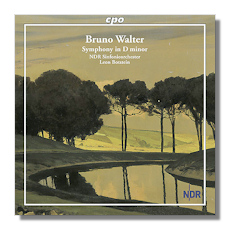
The Internet's Premier Classical Music Source
Related Links
- Walter Reviews
- Latest Reviews
- More Reviews
-
By Composer
-
Collections
DVD & Blu-ray
Books
Concert Reviews
Articles/Interviews
Software
Audio
Search Amazon
Recommended Links
Site News
 CD Review
CD Review
Bruno Walter

Symphony in D minor
North German Radio Symphony Orchestra/Leon Bostein
CPO 777163
Executive Summary: While Mahler's influence is obvious in the third movement and portions of the finale, not as much like Mahler as you would have thought; and about as good as you might have expected.
As with many of the great conductors, Bruno Walter (1876-1962) had at one time in his career considered being a composer. Hearing a work by a conductor often explains a great deal of how they think about music. I am often amazed that some very fine conductors have written such inconsequential music. Of my contemporaries, the names of Lorin Maazel, Michael Tilson-Thomas and Leonard Slatkin come to mind. How interesting it would be hear some of those student works by Toscanini! Then we have that decent Concerto for Double Bass by Koussevitzky, some superb music by De Sabata and some reasonably fine music by Weingartner. Based on the few works of Szell I have heard, he seems to have had some potential as a composer. And then, on the other extreme we have the very successful Mahler and Bernstein. While the jury is still out as to how long Bernstein's music will be with us, Mahler alone seems to have jumped the gap, perhaps nominally, to the holy grail of the standard literature. Bruno Walter's essay in symphonic form falls, to my ears, just below the music of Weingartner.
The Symphony is approximately an hour in duration. According to the program notes, Walter's Symphony dates from 1907, written before the composer turned thirty. Contrary to some notions, proffered in the program notes, that the music was somewhat modernist, (well it is more advanced than Brahms) I found it is clearly of its time. By this time Mahler was a friend and Walter had been hired by Mahler to work at the Vienna Court Opera. While one might expect an abundance of similarity to the music of Mahler, the obvious borrowings are not overwhelming. What is borrowed from Mahler is the approach to continuous development and evolution of the thematic material. Ideas are rarely repeated; they evolve. One of the clearest references to the "sound" of Mahler, including his characteristic use of the triangle, can be found in the charming third movement. An extended waltz, with trio, it serves the function of a scherzo movement. With much of the other music being slow, a true scherzo might have provided much needed contrast to the rest of the work.
One is left with the overall impression of a congenial, unpretentious work of moderate interest. With the exceptions of the Mahleresque Third Movement and the last third of the finale, nothing really lingers in the ear or the mind.
Botstein's reading gives time for the music to breath, perhaps a bit too much, as the musical argument seems, at times, to be unnecessarily protracted. I am not that much of a purest to refrain from suggesting that his interpretation could have benefited from some slightly faster tempi, even if the markings did not call for them. The playing of the orchestra is superb and the recorded sound is excellent.
It is wonderful to have the opportunity to hear this work and for that reason alone, I can highly recommend the acquisition of this recording. However, I doubt the merits of the music will engender much repeated listening.
Copyright © 2009, Karl Miller




















